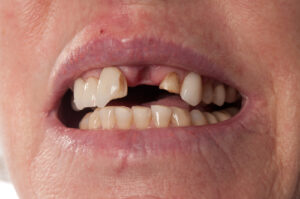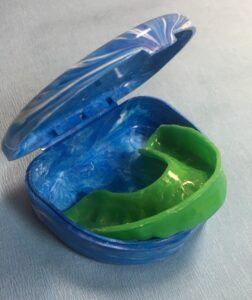Does My Child Need a Protective Mouthguard for Sports?
 We know there is still plenty of summer left to enjoy, and you probably are not thinking about fall sports for your kids. But maybe you should. Injuries to the face are quite common during sports practice and games.
We know there is still plenty of summer left to enjoy, and you probably are not thinking about fall sports for your kids. But maybe you should. Injuries to the face are quite common during sports practice and games.
Athletic mouthguards are an important way of protecting your child’s teeth, jaws and soft tissues during their sports activities. We’ll explain everything you need to know in this week’s blog.
What Can Happen During a Sports Injury to the Face?
Injuries to the face occur during a wide variety of sports, including hockey, football, soccer, baseball, and basketball. Whether the trauma results from a puck or ball hitting the face or another player’s body coming into contact, the outcome can be both painful and damaging to the oral tissues. Listed here are some of the injuries we see and treat that are associated with sports injuries.
Lacerations
Lacerations are cuts in the soft tissues of the lips, cheeks, or tongue. The teeth are usually the cause of the actual cut as the impact forces them into and sometimes through the soft tissues. The lips, cheeks and tongue are highly vascularized tissues, which means when cut, they will bleed easily and sometimes profusely.
These lacerations often require stitches to close the wound and stop the bleeding.
Chipped Teeth
The blunt force of an impact during a sports incident commonly chips and breaks teeth. Teeth are extremely hard and strong, but they will crack under high forces.
The extent of the break determines the necessary treatment. Some teeth break off at the root, making them unsalvageable. Some break into the nerve chamber, necessitating a root canal treatment. We can repair others by simply reattaching the broken fragment.
Dislodged Teeth
 Some sports injuries dislodge an entire tooth, root and all. Dentists refer to this as an avulsed tooth. We do have a chance at reimplanting and saving these teeth, but the success rate is not great. Obviously, we believe it is better to prevent the tooth from ever being knocked out in the first place!
Some sports injuries dislodge an entire tooth, root and all. Dentists refer to this as an avulsed tooth. We do have a chance at reimplanting and saving these teeth, but the success rate is not great. Obviously, we believe it is better to prevent the tooth from ever being knocked out in the first place!
Joint Injuries
Sports injuries often involve a blow to the jaw, either straight on from the chin or on the side of the face. This force compresses the jaw joints, causing the potential for slipped discs, torn ligaments, etc . . . Sports injuries can also result in whiplash, and this can have a dislocating effect on the jaw joints.
The effects in the jaw joints from blunt force trauma to the face often surfaces weeks to months after the injury.
Broken Jaws
Anytime the bones sustain large forces or high impact, there is the potential for fractures. The jawbones are no exception. Breaks at the mandibular condyle (near the jaw joints just in front of the ears) occur when the lower jaw is forced upward and/or backward.
Sometimes, under heavy forces, if the tooth does not break, the jawbone surrounding it does. We diagnose jaw fractures with digital x-rays of the jaws, and they often require oral surgery to repair.
How Does an Athletic Mouthguard Protect Against Those Problems?
Those all sound pretty scary, and we bet they are making a mouthguard sound like a good idea. Let us describe how they actually prevent the worst of those issues, so that you will be even more convinced!
Separation of Teeth from Lips, Cheeks, and Tongue
An athletic mouthguard can prevent the majority of soft tissue lacerations. This is because the mouthguard covers the teeth and separates them from the surrounding soft tissues. The flexible, rubbery material of the mouthguard will not cut or tear the inside of the lips, cheeks or tongue. It creates both a barrier and a shock absorber so that the teeth do not cut the soft tissues.
Separation of Upper and Lower Teeth
A mouthguard can completely prevent or lessen the severity of chipped and broken teeth because it separates the upper and lower teeth. It also covers the upper teeth, which are most susceptible to breaking from an injury to the face. Athletes who wear mouthguards typically do not suffer from dislodged or chipped and broken teeth.
This protection of the teeth from impact can literally save you thousands of dollars in dental treatments necessary to repair the damage from sports injuries.
Shock Absorber Effect for Jaws
The cushion that a mouthguard provides between the teeth absorbs much of the force sustained by the jaws during impact. This reduces the risk for TMJ problems and jaw fractures. Like withstanding a car accident with an airbag deployed, there is still the potential for damage, but it is much less than it would be without that cushion.
What are the Advantages of a Custom Professional Mouthguard?

Some of you may not even be aware that there are “professional” mouthguards available to you. A custom professional athletic mouthguard is one made for you (or whoever the athlete may be) by your dentist from an exact replica of the athlete’s mouth. We are proud to provide this service for our patients at Designer Smiles. Here are the reasons you should consider a custom professional mouthguard.
Less Bulky
Because we make the mouthguard from an exact replica of the teeth, it is much smaller and less bulky in size. We trim it to perfectly fit the inside of the athlete’s mouth. We know that comfort plays an important role in someone’s desire to wear a mouthguard.
Closer Fit
The closer fit of the customized guard also provides additional protection. Rather than looseness and air gaps between the mouthguard and the teeth, the fabrication in our dental lab on the patient’s model produces the closest fit for the best comfort and protection.
Higher Grade Material
The custom material that we use to make athletic mouthguards can withstand the nervous chewing and fidgeting of your athlete. The high grade rubbery material leads to a better fit and a longer lifespan for your mouthguard.
Longer Lasting
The thickness and material quality of a professional mouthguard is far superior to anything you can purchase over the counter. This high quality appliance will last for years, as opposed to generic guards, which may last only a few weeks.
Will an Over-the-Counter Mouthguard Work?
We know it is tempting to grab a mouthpiece off the shelf at the grocery store. The cheap, boil-and-bite guards claim to provide the same benefits that we have described above. Unfortunately, the level of protection is drastically lower with an over-the-counter mouthpiece.
We would rather every athlete wear something than nothing, so start with a drugstore mouthguard if you must. But if you have a committed athlete with years of sports ahead of him or her, it is time to invest in a custom professional athletic mouthguard.
More Questions about Athletic Mouthguards?
Call Designer Smiles today to schedule a consultation with Dr. Ann. She can answer any question you have about athletic mouthguards and tell you her personal story of what happens when you don’t wear one.
